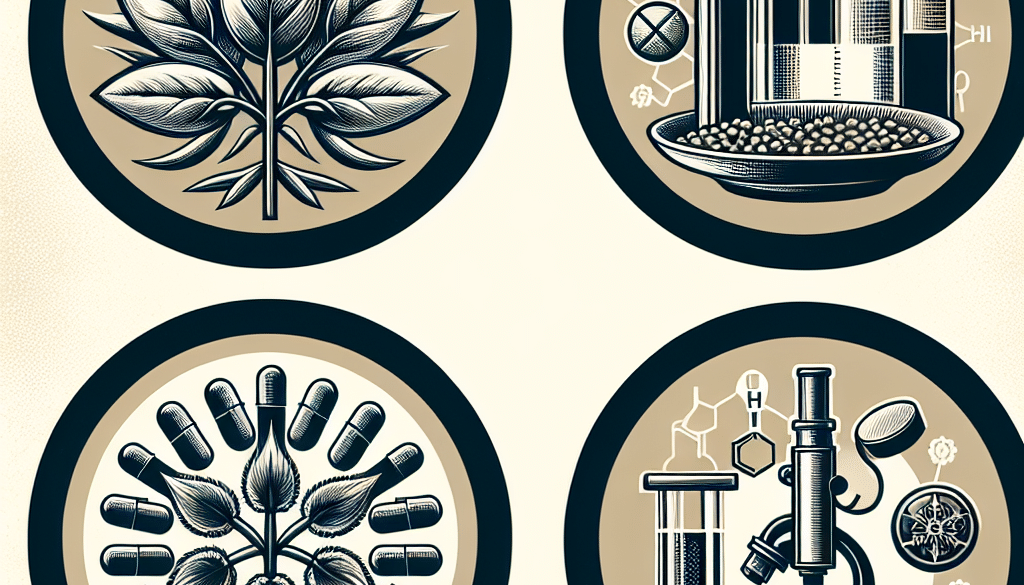4 Things Manufacturers Should Know About Ashwagandha
-
Table of Contents
- Ashwagandha Essentials: 4 Must-Know Facts for Manufacturers
- 1. Understanding the Source and Quality of Ashwagandha
- 2. The Importance of Clinical Trials and Research
- 3. Regulatory Compliance and Safety Standards
- 4. Market Trends and Consumer Preferences
- Conclusion
- Discover ETprotein’s Premium Protein Offerings
Ashwagandha Essentials: 4 Must-Know Facts for Manufacturers

Ashwagandha, also known as Withania somnifera, is an ancient medicinal herb that has been used for over 3,000 years to relieve stress, increase energy levels, and improve concentration. In recent years, the popularity of ashwagandha has surged in the health and wellness industry, making it a lucrative ingredient for manufacturers. However, there are critical aspects that manufacturers should understand to ensure they are providing a high-quality product that meets consumer expectations and regulatory standards.
1. Understanding the Source and Quality of Ashwagandha
Quality starts at the source. Ashwagandha is primarily grown in the drier regions of India, Nepal, China, and Yemen. Manufacturers must ensure that the plants are cultivated in optimal conditions to maximize the potency of the active compounds, known as withanolides.
- Organic Certification: Organic ashwagandha is preferred by health-conscious consumers. Manufacturers should source from farms that adhere to organic farming practices and have the necessary certifications.
- Testing for Withanolide Content: The therapeutic benefits of ashwagandha are attributed to withanolides. Manufacturers should conduct rigorous testing to confirm the withanolide content and ensure consistency in their products.
- Adulteration Concerns: With the increasing demand for ashwagandha, there is a risk of adulteration with similar-looking herbs. Manufacturers must implement strict quality control measures to prevent this.
2. The Importance of Clinical Trials and Research
Consumers are becoming more educated and are looking for evidence-based supplements. Clinical trials and research play a pivotal role in substantiating health claims made by manufacturers.
- Investing in Research: Manufacturers should invest in or support clinical research to validate the efficacy of their ashwagandha products. This not only builds trust with consumers but also helps in standing out in a crowded market.
- Understanding the Research: Manufacturers need to be well-versed in the existing scientific literature on ashwagandha to accurately inform consumers and avoid misleading claims.
3. Regulatory Compliance and Safety Standards
Ensuring that ashwagandha supplements comply with dietary supplement regulations is crucial for manufacturers. This includes safety, labeling, and manufacturing practices.
- Good Manufacturing Practices (GMP): Manufacturers must adhere to GMP to ensure their products are consistently produced and controlled according to quality standards.
- Labeling Requirements: Accurate labeling, including potential allergens, dosage instructions, and health claims, is essential to meet regulatory standards and inform consumers.
- Adverse Event Reporting: Manufacturers should have a system in place for reporting any adverse events associated with their ashwagandha products to the appropriate regulatory bodies.
4. Market Trends and Consumer Preferences
Staying abreast of market trends and consumer preferences can help manufacturers tailor their ashwagandha offerings to meet the evolving demands of the market.
- Delivery Formats: Ashwagandha is available in various forms, including capsules, powders, and liquid extracts. Manufacturers should consider offering multiple formats to cater to different consumer preferences.
- Combination Products: Ashwagandha is often combined with other adaptogens or ingredients for enhanced effects. Manufacturers should explore innovative combinations that align with current health trends.
- Transparency: Today’s consumers value transparency in sourcing, manufacturing processes, and ingredient purity. Manufacturers should prioritize transparency to build trust and loyalty.
Conclusion
In conclusion, manufacturers venturing into the ashwagandha market must prioritize the quality and sourcing of their raw materials, invest in research to support their product claims, adhere to regulatory compliance and safety standards, and stay informed about market trends and consumer preferences. By focusing on these four key areas, manufacturers can ensure they produce a safe, effective, and desirable ashwagandha product that meets the needs of today’s discerning consumers.
Discover ETprotein’s Premium Protein Offerings
For manufacturers looking to expand their product line with protein supplements, ETprotein offers a range of high-quality organic bulk vegan proteins that can complement ashwagandha supplements. Their products, including Organic rice protein, pea protein, and various seed proteins, are characterized by a neutral taste, non-GMO, and allergen-free attributes. With L-(+)-Ergothioneine purity over 98%, ETprotein caters to industries such as nutraceuticals, pharmaceuticals, cosmeceuticals, and food and beverage. To learn more about their offerings or to request a sample, contact ETprotein today.
About ETprotein:
ETprotein, a reputable protein and L-(+)-Ergothioneine (EGT) Chinese factory manufacturer and supplier, is renowned for producing, stocking, exporting, and delivering the highest quality organic bulk vegan proteins and L-(+)-Ergothioneine. They include Organic rice protein, clear rice protein, pea protein, clear pea protein, watermelon seed protein, pumpkin seed protein, sunflower seed protein, mung bean protein, peanut protein, and L-(+)-Ergothioneine EGT Pharmaceutical grade, L-(+)-Ergothioneine EGT food grade, L-(+)-Ergothioneine EGT cosmetic grade, L-(+)-Ergothioneine EGT reference grade and L-(+)-Ergothioneine EGT standard. Their offerings, characterized by a neutral taste, non-GMO, allergen-free attributes, with L-(+)-Ergothioneine purity over 98%, 99%, cater to a diverse range of industries. They serve nutraceutical, pharmaceutical, cosmeceutical, veterinary, as well as food and beverage finished product distributors, traders, and manufacturers across Europe, USA, Canada, Australia, Thailand, Japan, Korea, Brazil, and Chile, among others.
ETprotein specialization includes exporting and delivering tailor-made protein powder and finished nutritional supplements. Their extensive product range covers sectors like Food and Beverage, Sports Nutrition, Weight Management, Dietary Supplements, Health and Wellness Products, and Infant Formula, ensuring comprehensive solutions to meet all your protein needs.
As a trusted company by leading global food and beverage brands and Fortune 500 companies, ETprotein reinforces China’s reputation in the global arena. For more information or to sample their products, please contact them and email sales(at)ETprotein.com today.














